Select Language
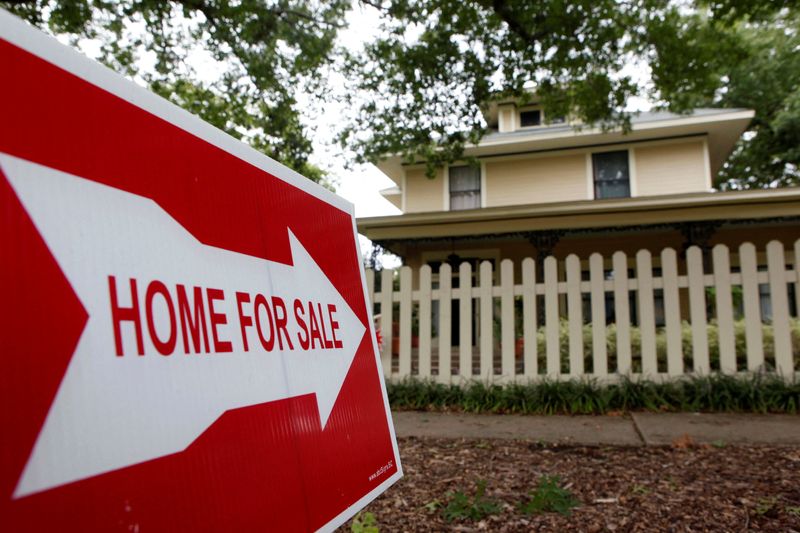
(Reuters) - Contracts to buy U.S. previously owned homes rose more than expected in November, notching a fourth straight month of gains as buyers focused on taking advantage of improved inventory despite stubbornly high mortgage rates.
The National Association of Realtors (NAR) said on Monday its Pending Home Sales Index, based on signed contracts, rose 2.2% last month to 79.0 - the highest since February 2023 - from 77.3 in October. Economists polled by Reuters had forecast contracts, which become sales after a month or two, would rise 0.9% after increasing 1.8% in October.
Pending home sales rose 6.9% from a year earlier. On a regional basis, the Midwest, South and West saw monthly increases while contract signings slipped in the Northeast. All four regions posted annual gains.
The increase in contract signings in November dovetailed with a second straight rise in existing home purchase completions last month reported previously by NAR. That earlier report showed the inventory of homes for sale in November was up by nearly 18% from a year earlier.
"Consumers appeared to have recalibrated expectations regarding mortgage rates and are taking advantage of more available inventory," said Lawrence Yun, the NAR's chief economist. "Mortgage rates have averaged above 6% for the past 24 months. Buyers are no longer waiting for or expecting mortgage rates to fall substantially. Furthermore, buyers are in a better position to negotiate as the market shifts away from a seller’s market."
Indeed, the rate on popular 30-year-fixed-rate mortgages has climbed in the past two months to the highest since July at 6.85%, according to Freddie Mac (OTC:FMCC), essentially counter-acting the interest rate cuts delivered since September by the Federal Reserve.
The 10-year U.S. Treasury note, which is the top influence in determining rates on most home loans, has climbed by roughly a percentage point since September. That has occurred as bond market investors have grown concerned about how policies favored by President-elect Donald Trump - such as tariffs, tax cuts and immigration crackdowns - might feed into higher inflation.
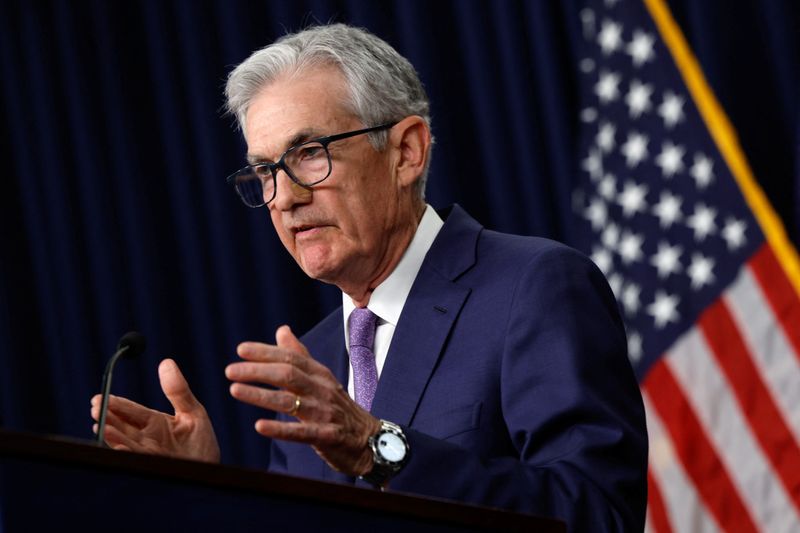
Investing.com -- Federal Reserve Chair Jerome Powell is navigating familiar territory as he heads into 2025, aiming to balance the central bank’s independence while avoiding confrontation with Donald Trump.
Powell’s challenge lies in managing monetary policy without appearing to preemptively counter potential inflationary pressures from the incoming administration’s policies.
The balancing act has been evident in recent months. Shortly after Trump’s election victory in November, Powell emphasized that the Fed wouldn’t speculate on how future policies might influence interest rates.
“We don’t guess, we don’t speculate, and we don’t assume,” Powell said on Nov. 7. However, the Fed’s latest projections suggest some officials are already accounting for policy changes, signaling fewer rate cuts in 2025 due to inflation concerns.
Last week, the Fed cut rates by a quarter point, completing a full percentage point reduction since September. Despite this, updated forecasts revealed a more cautious stance on easing.
Most officials now anticipate only two cuts next year, down from four projected in September. Inflation is expected to remain at 2.5% in 2025, up from earlier forecasts of 2.2%. Notably, 15 of 19 Fed officials see a risk that inflation could exceed projections.
Michael Gapen, chief U.S. economist at Morgan Stanley (NYSE:MS), noted the shift. The latest meeting “came out much more hawkish than we thought because they did what they said they weren’t going to do: They said they weren’t going to speculate on policies and then a month later they decided to speculate on policies,” he said.
A key factor behind this caution is Trump’s proposed economic agenda, which includes tariffs and stricter immigration policies. Tariffs could drive prices higher, while tighter border controls might constrain labor supply, increasing wages. Powell has downplayed the direct impact of Trump’s election on inflation forecasts, attributing the shift to recent inflation data instead.
Despite this, Powell has, according to the Wall Street Journal, privately advised colleagues to tread carefully in public remarks to avoid perceptions of political bias. This approach aligns with Powell’s efforts to maintain the Fed’s reputation for apolitical, data-driven decision-making.
The stakes are high. Powell recalls the Fed’s experience during Trump’s first term when trade wars led to rate cuts. Yet the current environment differs. Inflation has been elevated, unlike the low-inflation backdrop of 2018. Powell highlighted this distinction at his Dec. 18 press conference, referencing past internal Fed analyses.
“What the committee’s doing now is discussing pathways and understanding again the ways in which tariffs can affect inflation and the economy,” said Powell. “It puts us in position, when we finally do see what the actual policies are, to make a more careful, thoughtful assessment of what might be the appropriate policy response.”
Trump’s advisors argue that deregulation and increased energy production could offset inflationary risks. Treasury secretary-designate Scott Bessent downplayed concerns.
“Tariffs can’t be inflationary because if the price of one thing goes up, unless you give people more money, then they have less money to spend on the other thing, so there is no inflation,” he said on a radio program hosted by Larry Kudlow, a former Trump adviser.
Still, analysts believe the Fed will respond cautiously if supply-side improvements reverse.
“In this environment, you’re not coming from six years of below-target inflation. You’re coming from a few years of being well above target,” notes JPMorgan’s chief economist Michael Feroli.
Other analysts suggest that the economic environment will significantly influence how much businesses pass rising costs to consumers.
Economist Ray Farris believes that with full employment, cost increases are more likely to be passed through than during a downturn. He also highlights the uncertainty around how quickly companies adjust prices, explaining that gradual increases could make inflation appear more persistent to the public.

MANILA (Reuters) - Philippine President Ferdinand Marcos Jr. signed the 2025 budget into law on Monday, saying a planned 10% increase in government spending to a record 6.33 trillion pesos ($109.2 billion) would support economic growth and reduce poverty.
The spending is higher than a projection of 6.18 trillion pesos announced earlier this month, when revenue was forecast at 4.64 trillion pesos and the budget deficit at 5.3% of GDP."It is designed not just to address our present need but to sustain growth and to uplift the lives of generations that are yet to come," Marcos said following the ceremonial signing.The education sector has the largest budget allocation for 2025 with 1.053 trillion pesos, followed by the public works ministry at 1.034 trillion, Budget minister Amenah Pangandaman said in a press briefing.
Pangandaman said 35 billion pesos were earmarked for the military's modernisation programme, lower than the 50 billion pesos that government originally proposed.
Budget advocates have complained about reductions in the education budget and the removal of a subsidy for the government health insurance programme, among other cuts.
Marcos had delayed the signing by more than a week, citing the need to review the final spending plan approved by Congress. He said he had vetoed proposed spending of more than 194 billion pesos ($3.35 billion).
Government spending historically contributes around a fifth of the country's economic growth, which is targeted at 6.0% to 8.0% in 2025.
($1 = 57.908 Philippine pesos)
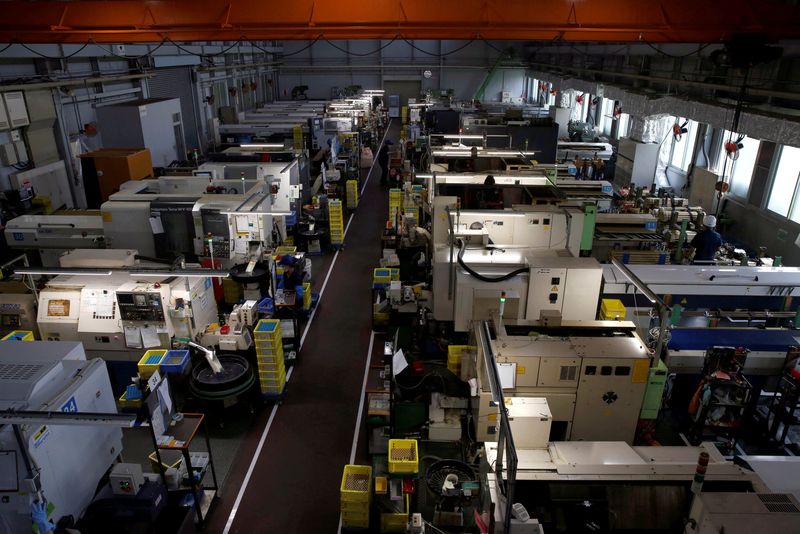
TOKYO (Reuters) - Japan's factory activity shrank at a slower pace in December as declines in production and new orders eased, a private-sector survey showed on Monday, edging closer to stabilisation after recent falls.
The final au Jibun Bank Japan manufacturing purchasing managers' index (PMI) rose to 49.6 in December, indicating the softest contraction in three months. The index was slightly higher than 49.5 in the flash reading and 49.0 in November but stayed below the 50.0 threshold that separates growth from contraction for the sixth straight month.
"The headline reading moved closer to neutrality amid softer reductions in both production and new order intakes," said Usamah Bhatti at S&P Global Market Intelligence, which compiled the survey.
The subindex of production shrank for a fourth straight month in December but the contraction was also slower than last month. Manufacturers noted that subdued new orders were the main factor behind the decline in output.
New orders contracted for the 19th straight month on subdued demand in both domestic and key overseas markets. Some firms in the survey suggested the semiconductor market was behind the weakness in new orders.
Employment expanded in December, reversing its fall in November, to reach its highest level since April. Firms in the survey said they hired more workers due to labour shortages as well as in preparation for future demand.
Input prices grew at the strongest pace since August, with firms citing higher costs of raw materials and labour. The weak yen also boosted inflation. To cope with rising prices, firms raised their output prices at the fastest rate in five months.
Manufacturers stayed confident about their outlook as they expect business to expand thanks to the launch and mass production of new products.
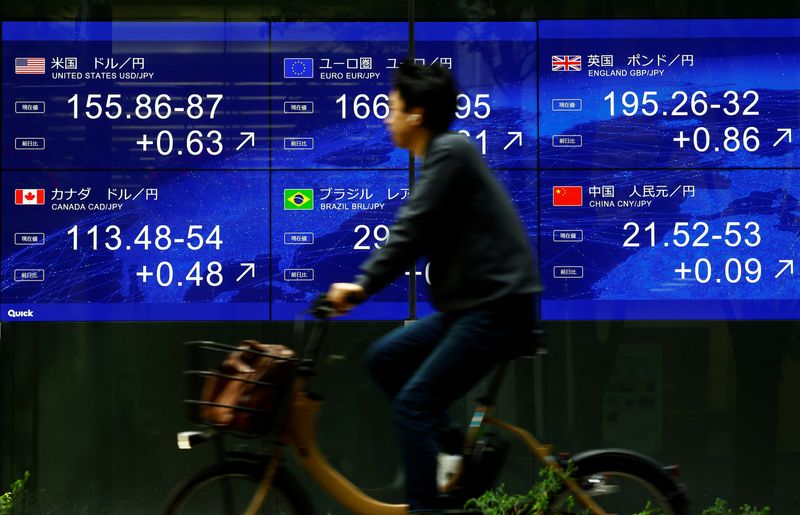
By Wayne Cole
SYDNEY (Reuters) - Asian shares edged lower on Monday as high Treasury yields challenged lofty Wall Street equity valuations while underpinning the U.S. dollar near multi-month peaks.
Volumes were light with the New Year holiday looming and a rather bare data diary this week. China has the PMI factory surveys out on Tuesday, while the U.S. ISM survey for December is due on Friday.
MSCI's broadest index of Asia-Pacific shares outside Japan dipped 0.2%, but is still 16% higher for the year. Japan's Nikkei eased 0.2%, but is sitting on gains of 20% for 2024.
South Korea's main index has not been so fortunate, having run into a storm of political uncertainty in recent weeks, and is saddled with losses of more than 9% for the year. It was last off 0.35%.
S&P 500 futures and Nasdaq futures were both off 0.1%. Wall Street suffered a broad-based sell off on Friday with no obvious trigger, though volumes were just two-thirds of the daily average. .[.N]
The S&P 500 is still up 25% for the year and the Nasdaq 31%, which is stretching valuations when compared to the risk-free return of Treasuries. Investors are counting on earnings per share growth of just over 10% in 2025, versus a 12.47% expected rise in 2024, according to LSEG data.
Yet yields on 10-year Treasuries are near eight-month highs at 4.631% and ending the year around 75 basis points above where they started it, even though the Fed delivered 100 basis points of cuts to cash rates.
"The continued rise in bond yields, driven by the reassessment of less restrictive monetary policy expectations, creates some concern," said Quasar Elizundia, a research strategist at broker Pepperstone.
"The possibility that the Fed may keep restrictive monetary policy for longer than expected could temper corporate earnings growth expectations for 2025, which could in turn influence investment decisions."
Bond investors may also be wary of burgeoning supply as President-elect Donald Trump is promising tax cuts with few concrete proposals for restraining the budget deficit.
Trump is expected to release at least 25 executive orders when he takes office on Jan. 20, covering a range of issues from immigration to energy and crypto policy.
Widening interest rate differentials have kept the U.S. dollar in demand, giving it gains of 6.5% for the year on a basket of major currencies.
The euro has lost more than 5% on the dollar so far in 2024 to last stand at $1.0429, not far from its recent two-year trough of $1.0344.
The dollar held near a five-month top on the yen at 157.71, with only the risk of Japanese intervention preventing another test of the 160.00 barrier.
The strength of the dollar has been something of a burden for gold prices, though the metal is still 28% higher for the year so far at $2,624 an ounce. [GOL/]
Oil has had a tougher year as concerns about demand, particularly from China, kept a lid on prices and forced OPEC+ to repeatedly extend a deal to limit supplies. [O/R]
Brent fell 37 cents to $73.80 a barrel, while U.S. crude lost 17 cents to $70.43 per barrel.
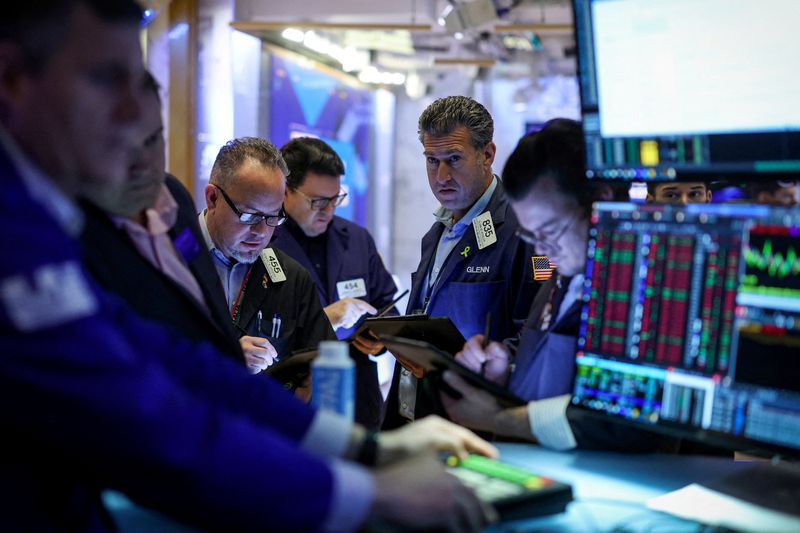
By Laura Matthews
NEW YORK (Reuters) -After closing the books on a banner year for U.S. stocks, investors expect to ride seasonal momentum into mid-January when a slew of economic data and a transition of power in Washington could send markets moving.
The S&P 500 rose roughly 25% in 2024 through Dec. 27, while the technology-heavy Nasdaq Composite index (IXIC), which surpassed 20,000 for the first time in December, is up over 31%.
On Friday, however, stocks sold off amid some profit taking and questions about how markets could perform in January, according to analysts and traders.
"There are concerns that maybe the first part of (next) year can involve some repositioning and reallocation of funds and those that are trading today and next week are probably just trying to get a little bit ahead of that," said Robert Pavlik, senior portfolio manager at Dakota Wealth.
Stocks tend to do well in the last five trading days of December and into the first two days of January, a phenomenon dubbed the Santa Claus rally, which has driven S&P gains of an average of 1.3% since 1969, according to the Stock Trader's Almanac.
Despite the Friday selloff, for the last five trading sessions, the S&P rose 1.77%, while the Nasdaq was up 1.8%.
Just how long upward momentum lasts will depend on several forces that could help drive markets in 2025.
Monthly U.S. employment data on Jan. 10 should give investors a fresh view into the health and strength of the U.S. economy. Job growth rebounded in November following hurricane- and strike-related setbacks earlier in the year.
The market's strength will be tested again shortly after, when U.S. companies start reporting fourth-quarter earnings.
Investors anticipate a 10.33% earnings per share growth in 2025, versus a 12.47% expected rise in 2024, according to LSEG data, although excitement over President-elect Donald Trump's policies is expected to boost the outlook for some sectors like banks, energy and crypto.
"There's the hope that taxes and regulations will be lowered or reduced next year, that will help support corporate profits, which are what drive the market in the first place," said Michael Rosen, chief investment officer at Angeles Investments.
Trump's inauguration on Jan. 20 could also throw the markets some curve balls. He is expected to release at least 25 executive orders in his first day on a range of issues from immigration to energy and crypto policy.
Trump has also threatened tariffs on goods from China and levies on products from both Mexico and Canada, as well as to crack down on immigration, creating costs that companies could ultimately pass on to consumers.
Helen Given, associate director of trading at Monex USA, said a new administration always brings with it a large degree of uncertainty. There is also a good chance the impact of the Trump administration's expected trade policies is far from fully priced into global currency markets, she added.
"We're looking ahead to see which of those proposed policies actually are enacted, which might be further down the pipeline," Given said, adding she expected a big impact on the euro, Mexican peso, the Canadian dollar, and the Chinese yuan.
The conclusion of the Federal Reserve's first monetary policy meeting of the year in late January could also present a challenge to the U.S. stocks rally.
Stocks tumbled on Dec. 18 when the Fed implemented its third interest-rate cut for the year and signaled fewer cuts in 2025 because of an uncertain inflation outlook, disappointing investors who had expected lower rates to boost corporate profits and valuations.
Still, that could be good for alternative assets like cryptocurrencies. The incoming crypto-friendly Trump administration is adding to a number of catalysts that are boosting crypto investors' confidence, said Damon Polistina, head of research at investment platform Eaglebrook Advisors.
Bitcoin surged above $107,000 this month on hopes of friendlier Trump policies.
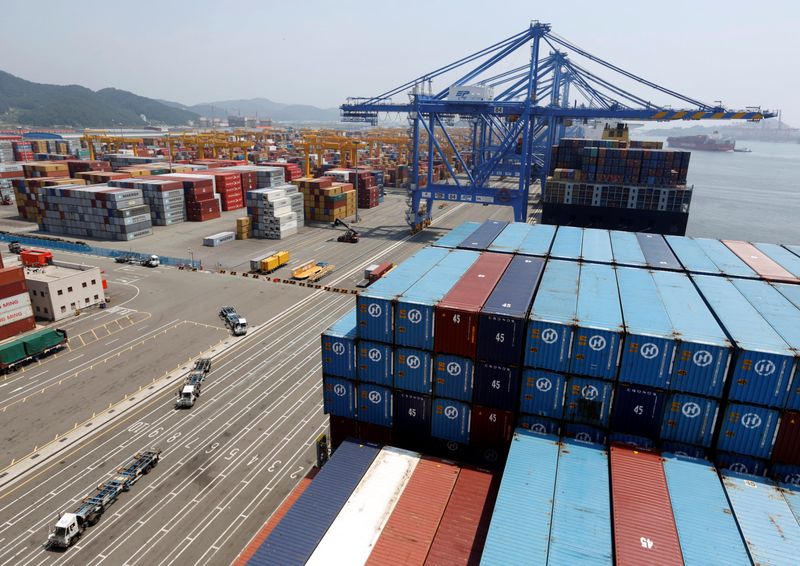
By Jihoon Lee and Cynthia Kim
SEOUL (Reuters) - South Korea's export growth is expected to have risen in December for a 15th straight month, but analysts feel momentum could moderate in the year ahead as concerns about possible U.S. tariffs heat up, a Reuters poll showed on Friday.
Outbound shipments from Asia's fourth largest economy are forecast to have risen 4.0% in December from a year earlier, after a gain of 1.4% in November, the median finding in a survey of 10 economists.
That would be the 15th successive month of annual export growth but analysts see the rate slowing in the coming year as demand for South Korean goods is expected to weaken, except for semiconductors, analysts said.
"Trade policy uncertainties heightened since Donald Trump was elected in the United States continue to pose risks for exporters," said Ha Keon-hyeong, an analyst at Shinhan Securities.
"It's part of the reason why some manufacturers are cutting down on production."
The U.S. president-elect has pledged to impose big tariffs on imports from major trading partners including China, South Korea's biggest trading partner.
The first major exporting economy to report trade figures each month, South Korea is set to issue December monthly data on January 1 at 9 a.m. (0000 GMT).
"Car production in December was hit by labor union strikes and export momentum in general is weakening, except for chips and information technology products," said Stephen Lee, chief economist at Meritz Securities Research Center.
The survey also forecast imports to have risen 4.6% in December, after November's fall of 2.4%.
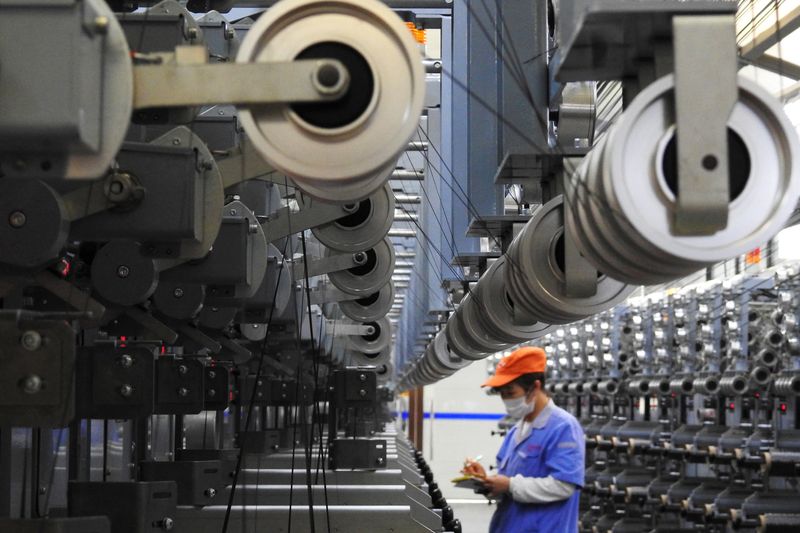
BEIJING (Reuters) -China's industrial profits fell at a slower clip in November, official data showed on Friday, but the annual decline in earnings this year is expected to be the worst in over two decades due to persistently soft domestic consumption.
The world's second-largest economy has been struggling to mount a strong post-pandemic revival, as business and household appetites for spending and investment remain subdued amid a prolonged housing downturn and fresh trade risks from the incoming U.S. administration of President-elect Donald Trump.
Industrial profits fell 7.3% in November from the same month last year, following a 10% drop in October, National Bureau of Statistics (NBS) data showed.
The narrower decline in November pointed to improved profits as recent economic stimulus measures start to have an effect, said Zhou Maohua, a macroeconomic researcher at China Everbright (OTC:CHFFF) Bank.
The profit numbers were also in line with a slower decline in factory-gate prices in November. The producer price index fell 2.5% year-on-year versus the 2.9% drop in October.
The World Bank on Thursday revised up its 2024 economic growth forecast for China slightly to 4.9% from its June forecast of 4.8%.
Still, in the first 11 months of 2024, industrial profits declined 4.7%, deepening a 4.3% slide in the January-October period, reflecting still tepid private demand in the Chinese economy.
China's full-year industrial profits are set to show their biggest drop in percentage terms since 2011. However, when smaller companies are included under a previous compilation methodology, this year's profit decline is expected to the worst since at least 2000.
A spate of economic indicators released this month pointed to mixed results, with industrial output accelerating in November while new home prices fell at the slowest pace in 17 months.
The industrial sector is undergoing an uneven recovery amid insufficient demand, Zhou said, pointing to difficulties facing real estate and some related industries as evidence of this malaise.
China's leaders vowed in a key policy meeting this month to raise the deficit, issue more debt and loosen monetary policy to maintain a stable economic growth rate. The government also recently pledged to step up direct fiscal support to consumers and boosting social security.
Beijing has agreed to issue a record $411 billion special treasury bonds next year, Reuters reported.
Profits at state-owned firms fell 8.4% in the first 11 months, foreign firms posted a 0.8% decline and private-sector companies recorded a 1% fall, according to a breakdown of the NBS data.
Industrial profit numbers cover firms with annual revenues of at least 20 million yuan ($2.7 million) from their main operations.
($1 = 7.2988 Chinese yuan renminbi)
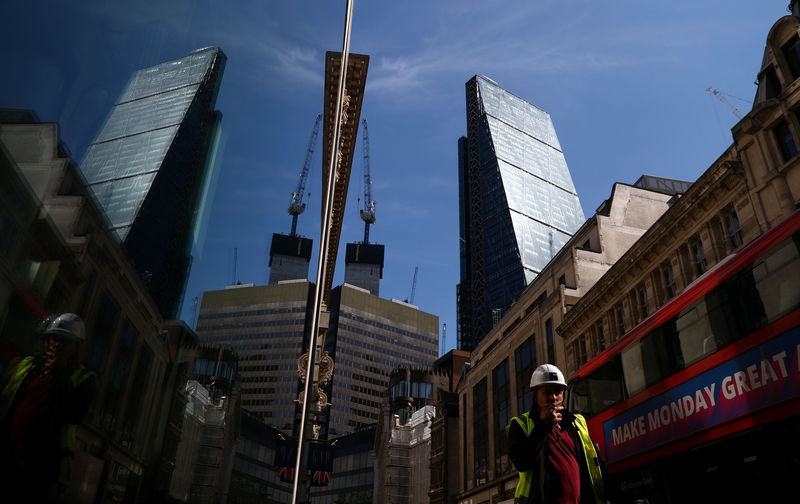
Investing.com -- The UK is set to outperform its European counterparts over the next 15 years, maintaining its position as the world’s sixth-largest economy by 2039, according to the Centre for Economics and Business Research.
Britain will hold its lead over France, which is projected to remain in seventh place, while Germany, Italy, and Spain are expected to slip down the global rankings. The UK is forecast to narrow the economic gap with Germany, which will be 20% larger than Britain’s economy in 2039, compared to the current 31%.
“While this outlook is markedly better than key European peers like France and Germany, both of whom are expected to slip, this reflects a relatively poorer outlook for Eurozone economies rather than strong UK growth,” CEBR said.
The report comes as Prime Minister Keir Starmer faces economic challenges during Labour’s early months in government. Official data show no economic growth since Labour took power in July, with survey indicators pointing to a weak end to 2024 and further strain into 2025.
Starmer’s plans to drive faster growth through planning reforms, housing initiatives, and public investment aim to reinvigorate the economy. However, CEBR warns that recent tax hikes could weigh on short-term activity. Over the longer term, it expects Britain’s trend growth rate to stabilize at 1.8%.
Globally, the United States is projected to retain its position as the largest economy, fending off competition from China.
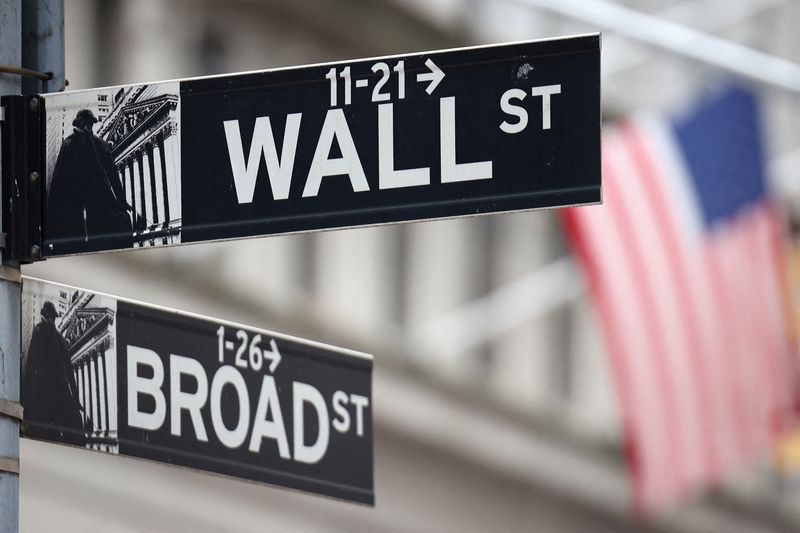
By David French
(Reuters) -The Dow Jones Industrial Average closed fractionally higher on Thursday, stretching its winning streak to five sessions despite light trading volumes and rising U.S. Treasury yields weighing on some of the dominant technology megacaps.
While the Nasdaq Composite and the S&P 500 were broadly unchanged, the indexes both finished slightly in negative territory. This snapped the Nasdaq's four-session run of higher closes, and ended the S&P 500's own run at three sessions.
On a day of few catalysts, investors responded to yields on U.S. government bonds inching higher, including the yield on the benchmark 10-year Treasury note hitting its highest since early May at 4.64% earlier in the session.
A strong auction of seven-year notes early in the afternoon though helped yields come off slightly, with the 10-year note at 4.58% in late-afternoon trade.
Higher yields are traditionally seen as negative for growth stocks, as it raises the cost of their borrowing to fund expansion. With markets increasingly dominated by the megacap technology stocks known as the Magnificent Seven, crimping their performance - especially in lieu of other market catalysts - will put downward pressure on benchmark indexes.
The S&P 500 slipped 2.45 points, or 0.04%, to 6,037.59 points, while the Nasdaq Composite lost 10.77 points, or 0.05%, to 20,020.36. The Dow Jones Industrial Average rose 28.77 points, or 0.07%, to 43,325.80.
Six of the megacaps fell, with Tesla (NASDAQ:TSLA) leading decliners with a 1.8% fall. The outlier was Apple (NASDAQ:AAPL), rising 0.3% and continuing to edge closer to becoming the first company in the world to hit a market value of $4 trillion.
The megacap tech stocks came off somewhat in the summer, as investors sought to rotate some capital into other sectors offering more value. Since the U.S. elections in November though, they have resumed their drive upwards and have outperformed the equal-weighted version of the S&P 500, said Adam Turnquist, chief technical strategist for LPL Financial (NASDAQ:LPLA).
"As a technician, what you want to see is breakouts in absolute terms and relative terms and the Mag 7 is checking the boxes there, so very constructive leadership going into the year-end," he said.
The three main indexes have hit multiple record highs this year on hopes of a lower interest rate environment and the prospects of artificial intelligence boosting corporate profits.
However, U.S. stocks have hit a speed bump in the final month of the year following an election-led rally in November as investors assess the Federal Reserve's projection of fewer interest rate cuts in 2025.
Looking ahead, LPL Financial's Turnquist said the last few weeks have seen significant reliance on the Magnificent Seven stocks driving markets higher, and we may be starting to see the cracks in this momentum. Therefore, to see further benchmark index increases, we will need to see input from other sectors of the economy.
One data release on Thursday showed the number of Americans filing new applications for jobless benefits dipped to the lowest in a month last week, consistent with a cooling but still healthy U.S. labor market.
Markets are in a seasonally strong period - called the "Santa Claus rally" - a pattern attributed to low liquidity, tax-loss harvesting and investing of year-end bonuses.
The S&P 500 has gained an average of 1.3% in the last five trading days of December and the first two days of January since 1969, according to the Stock Trader's Almanac.
Cryptocurrency-related stocks were down after Bitcoin declined 3.9%. MicroStrategy, MARA Holdings and Coinbase Global (NASDAQ:COIN) all fell between 1.9% and 4.8%.
Among the 11 S&P sectors which traded lower were consumer discretionary, off 0.6%, and the energy index, which slipped 0.1% as it tracked marginal weakness in U.S. crude prices. [O/R]

